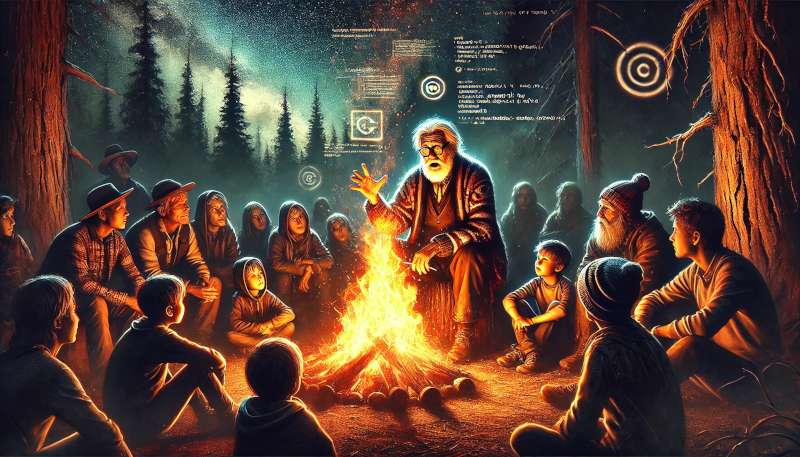The Tale of the Smart Pockets: A Campfire Story

The fire crackles softly, casting flickering shadows on the faces of the gathered listeners. The old timer, his face weathered and his eyes filled with memories, leans forward. His voice, though raspy, carries a weight of wisdom as he begins to speak.
Gather 'round, young ones, and let me tell you a tale of what was, what could have been, and what came to pass. It's a story from long before the world we know now, back when the lights of civilization burned bright and the marvels of technology were in every hand.
The World That Was
Back in those days, every man, woman, and child carried a little piece of magic in their pockets. They called 'em "smart devices." Now, these weren't like the tools and trinkets we use today. No, these gadgets were wondrous things, capable of waking you up in the morning, telling you what to eat, how far to walk, and even when to rest. They knew your heartbeat, your steps, your moods, and your thoughts.
Imagine a world where your every move was watched over by an invisible companion. These devices were like silent guardians, always there, always watching, and always guiding.
The Promise and the Peril
At first, it seemed like a dream. Folks marveled at how these devices made life easier, healthier, more connected. But you see, there's always a shadow lurking behind the brightest light. These little marvels started to shape people's lives in ways they never expected. They collected every bit of information about you, stored it away in vast data vaults. People were so enamored with the convenience that they hardly noticed how much control they'd given up.
These devices could nudge you to exercise more, suggest what to eat, even remind you to smile. They made decisions for you, so gradually that you barely noticed your own will slipping away. It's a curious thing, the human condition. We're always striving for improvement, seeking ways to make life easier. But in our pursuit of comfort and efficiency, we often overlook the costs. We traded our freedom for convenience, our privacy for personalized recommendations.
What Could Have Been
There was a time when people could have turned the tide. They had the knowledge and the means to maintain their autonomy, to keep a balance between man and machine. If only they'd seen the signs earlier, understood the need for privacy and critical thinking. If only they'd taken breaks from their devices to reconnect with the world around them and with their own minds. But hindsight, as they say, is a cruel teacher.
Human nature craves connection, craves guidance. It's in our bones to seek out paths of least resistance. And yet, it's in those very bones that the strength to resist lies. People forgot that they had the power to choose, to question, to step back and see the bigger picture. They forgot that true freedom isn't just about doing what you want but about having the wisdom to understand what you need.
The Fall
It didn't happen overnight. Little by little, society became more dependent on these smart devices. People's lives were intertwined with the data streams and the algorithms. They lost the skills to think for themselves, to decide for themselves. The machines knew best, and that was that.
Then came the day when the great systems that powered these devices collapsed. Maybe it was a massive solar storm, or a cataclysmic failure in the global networks. No one remembers the exact cause anymore, but the effect was devastating. Overnight, the world plunged into chaos. Without their smart devices, people didn't know how to function. They were lost, helpless, unable to fend for themselves.
Here lies the paradox of human nature: our greatest strength is our ability to adapt, yet our greatest weakness is our tendency to rely on crutches. The collapse forced people to confront their own frailties, their overdependence on the very tools they created to make life easier.
The Aftermath
From the ashes of that collapse, we built a new world. A simpler world, where we rely on our own wits and strengths. We learned hard lessons from the folly of our ancestors. Now, we live by the sweat of our brows and the strength of our hands, not by the whims of unseen algorithms.
In this new world, we rediscovered the essence of what it means to be human. The joy of a hard day's work, the satisfaction of solving problems with our own minds, and the value of face-to-face connections. We found a balance that had been lost in the pursuit of technological advancement.
The Moral
So, young ones, remember this tale. Technology is a double-edged sword. It can uplift and enlighten, but it can also control and diminish. Always think for yourselves, value your privacy, and never forget the lessons of the past. The real threat wasn't the robots at the door; it was the tiny devices in our pockets that we let rule our lives.
The story of the smart pockets is a reminder of the delicate balance between progress and preservation. As humans, we're driven by an insatiable curiosity and a desire to improve our circumstances. But with that drive comes responsibility. The responsibility to question, to challenge, and to ensure that in our quest for a better life, we don't lose the very essence of what makes us human.
The old timer leans back, his story told. The fire crackles louder as the listeners sit in reflective silence, absorbing the wisdom passed down from a world long gone.